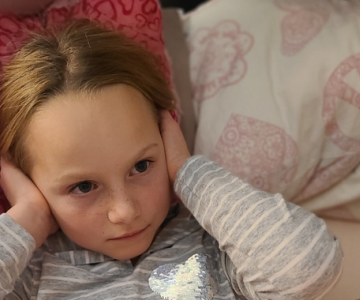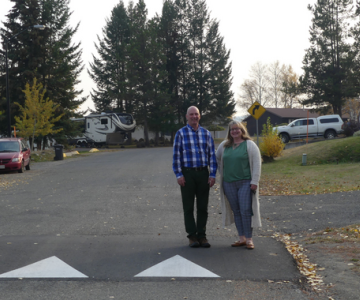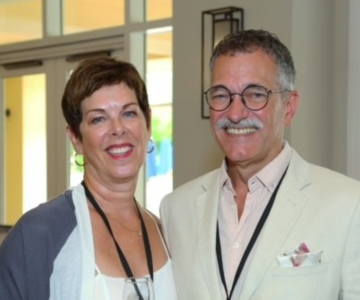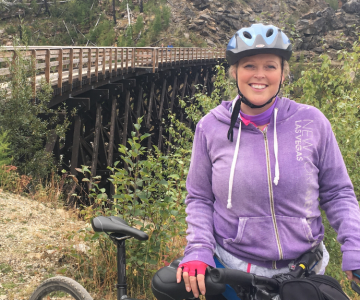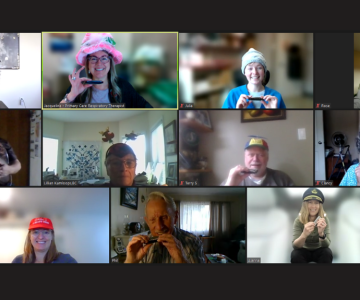Breadcrumb
Explore Stories
4 Minute Read
Health & Wellness
“Mommy, Mommy, make it stop!”
“Make what stop?”
“It’s loud. They’re yelling!”
“Shhhhh, sweetie, no one is yelling.”
“Stop, stop, aaaaaaaaaaaahhhhhh.”
It’s 7 a.m. and, after I spent the night treating her high fevers, Marissa is finally feeling better but is suddenly terrified by what she’s hearing.
Most parents would be similarly terrified while seeing their child in such distress; flailing, yelling and confused. Not me. As an emergency doctor I have seen many other kids hallucinating these last few weeks while sick with Influenza A.
Our emergency department has been visited by children hearing loud sounds, seeing objects as too large or too far away, and feeling scared that someone or something is trying to hurt them.
These young patients have all been influenza positive.
2 Minute Read
Community & Culture
Name: Rebecca Myers (she/her/hers)Job Title: Patient Registration ClerkYears of Service: 20Worksite: Cariboo Memorial HospitalCommunity: Williams LakeAncestral Territory: SecwepemcAdvice to live by: You can die in debt.
Self-described as short and feisty, Rebecca Myers, patient registration clerk in Williams Lake, celebrated her 20th anniversary with Interior Health this year.
Rebecca started her career at Interior Health (IH) as a medical laboratory assistant, only just switching to patient registration in mid-2022 to expand her learning possibilities.
3 Minute Read
Health & Wellness
The District of 100 Mile House, situated on the traditional territory of the Secwepemc people, firmly supports the mindset that road safety is everyone’s business. With a population of just 15,000 in the district, it’s a small but progressive community. In fact, 100 Mile House has lowered all the speed limits on their municipal roads to 30 km/h, the same speed for school zones and playgrounds during posted hours.
The community continues to take all reasonable steps to lower the injury risk for their residents and vulnerable road users (e.g., pedestrians, roadside workers, cyclists, and people who use e-scooters, e-bikes, skateboards, etc.).
“It’s important that everyone plays their part to prevent transportation-related injuries,” said Dr. Silvina Mema, Medical Health Officer, Interior Health. “These injuries also affect our communities in other ways. There are significant personal impacts, as well as health-care costs, for people who experience serious injuries.”
3 Minute Read
Community & Culture
Name: Dr. Carol Ward (she/her/hers)Job Title: Geriatric psychiatristYears of Service: 17Worksite: Royal Inland HospitalCommunity: KamloopsAncestral Territory: Tk’emlúps te SecwépemcAdvice to live by: Be curious.
Personal stories hold immaculate power, especially in their ability to connect people in the most authentic and meaningful way. Because of this reason, Dr. Carol Ward, a geriatric psychiatrist, ensures that understanding personal stories become the cornerstone of a patient’s treatment plan.
Carol is most known for her work in caring for older adult patients living with dementia - whom she shares a special and natural connection with. Growing up in the Atlantic Provinces, Carol recalls having friends who were extraordinarily funny and resilient seniors.
5 Minute Read
Community & Culture
Interior Health has been running a program that gives people who have lived with or have living experience with substance use the opportunity to get involved and share their voice.
IH’s Peer Inclusion and Engagement Project offers a variety of ways that people can share their expertise: through employment with IH as a Peer Support Worker, or through Peer Advisory Group and Peer Volunteer roles (both of which pay honorariums).
Brock Thomas is a Peer Volunteer with the program and a member of the Spallumcheen (Splatsin) Band. He was recruited to be part of the Integrated Treatment Team in North Okanagan (Enderby/Salmon Arm area) and has been with the program from the beginning; he was one of the first to complete the intensive 11-week, provincial peer support training curriculum in 2020. Brock’s involvement in a pilot peer support initiative with the Splatsin community has been integral to exploring ways in which the IH peer program can potentially strengthen connection and supports in an Indigenous community.
“There is a toxic drug crisis in British Columbia,” Brock said. “Twelve people have died in the past year in my community from overdose and I wanted to be part of change.”
2 Minute Read
Health & Wellness
Exposure to radon gas is a preventable health risk. The only way to know the level of radon gas in your indoor environment is to test for it.
We encourage residents living, working and playing in the B.C. Interior region to test for radon in their homes, places of work and indoor leisure environments.
2 Minute Read
Community & Culture
Name: Christine Olmstead (she/her/hers)Job Title: Operations knowledge coordinatorYears of Service: 15Worksite: CHSCCommunity: Central OkanaganAncestral Territory: Central OkanaganAdvice to live by: You cannot control others’ actions; you can only control your own reaction.
Christine Olmstead was born in Vanderhoof, B.C. and raised in Penticton. She describes herself as motivated, passionate, supportive and caring. Christine has been with Interior Health since 2005, starting as a community health worker while completing her Bachelor of Science in Nursing at UBC Okanagan in 2007. She was hired as a casual home health RN right after graduation.
In her role as an operations knowledge coordinator, Christine provides front-line home health clinical staff, team leads and managers with required education sessions and support in their learning through Ministry of Health directives, regional roll-outs and changes at an operational level. She also supports orientation requirements and education for new home health staff.
Another part of Christine’s role is “translating knowledge.” This involves interpreting information received from leadership (such as practice leads and directors) and presenting it to staff in ways that they are able to understand, prioritize and incorporate into their current practice. “We have to take into account that adults learn in different ways, and we have to be flexible and aware of what works and what doesn’t,” says Christine.
4 Minute Read
Health & Wellness
The sound of a harmonica playing Happy Birthday is heard down the hall of the Kamloops Primary Care Clinic, making those around smile.
It’s Wednesday, which means a Harmonicas for Health (and Happiness) virtual class is taking place. Participants from across Interior Health are receiving a harmonica lesson and being led through guided breathing exercises. Along with an artistic spirit, the participants share another thing in common; they have a lung disease known as chronic obstructive pulmonary disease (COPD), which causes obstructed airflow from the lungs.
Harmonicas for Health (and Happiness) teaches people with COPD how to have better control of their breathing. It exercises the muscles that help pull air in and push air out of the lungs and strengthen abdominal muscles for a more effective cough. The program also helps them get a self-confidence boost, relieve stress, socialize with others and have fun.
“It’s a fun and innovative initiative to engage a section of our population that is often isolated,” said Dr. Jas Kambo, Kamloops respirologist and the Harmonicas for Health (and Happiness) physician champion. “This platform provides a social structure and sense of community while engaging them in rehabilitation programs that we expect will enhance their quality of life and lung function.”
3 Minute Read
Community & Culture
At Interior Health (IH), we’re committed to improving health services and outcomes for all Aboriginal people. Partnerships, such as the one between IH and Métis Nation BC (MNBC), are crucial to changing our health system and eliminating racism and discrimination.
The blueprint for this partnership is a formal agreement called a Letter of Understanding (LOU). The LOU provides oversight in the planning, service delivery and decision-making processes that affect the health and wellness of Métis people living in the Interior Region.
“As a Métis leader within the Aboriginal Partnerships portfolio it is really exciting to see relationships between the Métis Nation BC and IH strengthening and expanding," says Aboriginal Partnerships Corporate Director Kris Murray. "It is fulfilling to be able to see the results of the work we do at the MILT and LOU come through to my local Chartered Community, the Rocky Mountain Métis Association, and others across the region. I look forward to continuing to support our partnership and drive change for the improved wellbeing of Métis Citizens.”
Read our LOU with MNBC, the longest standing one among B.C. health authorities
The MNBC-IH LOU Joint Committee recently refreshed their work plan to focus attention on:
Advancing commitments within the LOU agreement
Addressing racism
Métis engagement on joint priorities
Advancing cultural safety and humility
Data management.
There is a commitment to re-sign the MNBC-IH LOU at the 2023 MNBC Annual General Meeting in September 2023.
The Métis Interior Leadership Table (MILT) oversees the implementation of the MNBC-IH LOU. MILT is a place where MNBC and IH executives focus on the distinct health and wellness needs of Métis people through proactive planning and joint decision making. MILT has agreed to embed Métis culture and learning into future meetings and cultural exchange events. MILT also provides leadership and guidance in resolving current policy, program and service issues.
Recruitment is underway for a Métis Health Systems Advocate. The position will work closely with the 15 Métis Chartered Communities in the Interior Region to represent the needs and priorities of MNBC and to inform IH policy, programs, strategic planning, and vision.
Last June, IH leadership and staff participated in the Elders Forum hosted by MNBC. The event brought together Métis leadership, Elders, caregivers, citizens and service providers to identify and discuss regional needs and priorities with respect to supportive care for Métis Elders in B.C.
MNBC leadership also joined the IH podcast, Interior Voices (which explores topics related to Aboriginal health and wellness) for last year’s acknowledgement of Louis Riel Day. They talked about the significance of the day, Métis health and wellness. There were interviews with Debra Fisher and Dean Gladue.On Nov. 16, listen to Interior Voices’ Louis Riel Day episode, featuring a discussion with Métis historian Brodie Douglas
-
Load More
Showing 279 of 677
STAY CONNECTED
Receive news and alert posts, and Stories@IH blog posts, right to your inbox!

